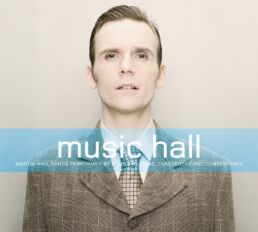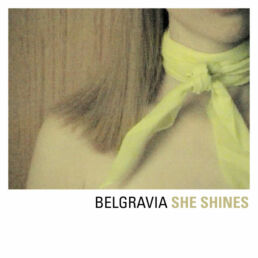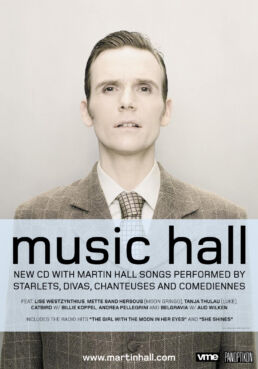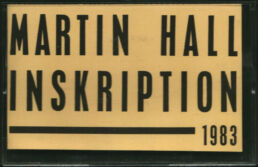Month: September 2003
MUSIC HALL
MUSIC HALL
MARTIN HALL
CD
SEPTEMBER 2003
PANOPTIKON (OPTIK 02)
At the time of its release Music Hall – subtitled “Martin Hall songs performed by starlets, divas, chanteuses and comediennes” – presented its audience to 18 new songs and recordings performed by some of the best new female artists in contemporary Danish music (many of them were nominated at the Danish Music Awards the same year). The album also spawned the hit single “She Shines”.
1. Another Heart Laid Bare (3:19)
2. The Girl with the Moon in Her Eyes (3:15)
3. Lovers in the Rain (4:26)
4. Doing The Continental (2:37)
5. Catching the Dust 2:03)
6. Documentary 1 (Mads Nørgaard) (0:34)
7. She Shines (3:51)
8. Pantomime (2:29)
9. Face Map (1:51)
10. Moody (4:27)
11. Documentary 2 (Talkshow Guest) (1:02)
12. The Stranger in Your Voice (1:08)
13. Blue Eyes Bolero (2:50)
14. Etiquette (3:13)
15. Documentary 3 (Jeff Matthews) (1:38)
16. Introducing Burning Sugar (1:19)
17. Burning Sugar (4:13)
18. Goodnight (2:23)
ANOTHER HEART LAID BARE
Another heart laid bare on the doorstep to my exile
Another pantomime to disbelieve
I see your bended head
Always humble in the daylight
Playing the servant’s role to never see
Of all the images that you left for my keeping
The one I like the most is the world outside
I never thought I would but the distance seems so perfect
I can’t deny the fact that I’m pleasantly surprised
Another victim cries
Pointing fingers at the heavens
Declaring me the crime of centuries
The traces on my skin
They keep shining in the nighttime
A fingerprint on every memory
THE GIRL WITH THE MOON IN HER EYES
Hey
See that smile
High and dry
It’s the girl with the moon in her eyes
God
What a dress
What a mess
I wish I could look something like that
Chaotic and genius
Bang
There she goes
What a show
Better hold on to all you’ve got
She’s tearing the world apart
Guys in the crowd
Hanging out
Never know what to do
It’s a zoo
Behaving like imbeciles on the loose
Whenever she’s walking down the street
She’s breaking the heart of boys she meets
You wouldn’t believe the things she’s capable of
She’s dropping a handkerchief or two
And suddenly everyone’s acute
‘Cause all of the world wanna follow her home
She’s got them all in her hand
Her song and her dance’s gonna get you
It’s such a wonderful sight
The look in her eyes is divine
You simply ain’t got a chance
It’s out of your hands, better run boy
‘Cause at the end of the night
She’s kissing goodbye with them all
Hey
Do you see what I mean?
It’s the girl with the moon in her eyes
Don’t try to fight
Walk on by
If she gets you
You’re out of your mind
And into a bag of mice
LOVERS IN THE RAIN
It’s like a merry go round
That goes up and down all the time
You’ll see a face in the crowd
Without any doubt in your mind
You just know that he’s the one
Or that she’s where you belong
In her loving arms, the only place to be
Lovers in the rain
Strangers on a train
Everything will change and stay the same
Sweet as any lover’s words
Hard as any lover’s hurt
Lovers in the rain
Lovers on their way
Lovers on a thousand midnight trains
Hidden like a memory
A little bit of history
Another Hemingway girl
Who’s turning the world for a boy
You see them hanging around
In cafés and bars all the time
When they say the magic words
It’s the sweetest sound you’ve heard
No one cares about the writing on the wall
Lovers in the rain
Strangers on a train
Everything will change and stay the same
Sweet as any lover’s words
Hard as any lover’s hurt
Lovers in the rain
Lovers on their way
Lovers on a thousand midnight trains
Hidden like a memory
A little bit of history
They never see it coming
Hurting
Falling like a little scene
They’re always high and mighty
Only into in their own little dream
But just a little make-believe
A little bit of mystery
Is all you need
DOING THE CONTINENTAL
Now really
Close doesn’t count
Not at all
It’s just your vanity making its call
You’re such a promising light
At least for a while
When I’m bored
So many little Napoleons fail
They’re never getting the point of the game
They’re trying too hard to please
It’s such a relief
When they’re gone
The laughter in the rain
We’ll take a turn again
When I’ve regained my breath
I’ve seen a lot of dead people on drugs
Hanging around in cafés like they’re not
Inhaling nicotine candy
And quoting that Andy cliché
In a world full of sad girls with great looks
I’ll be your Martini Girl
I’ll be late for a thousand appointments
But still I’m your girl
I’m flirtatious
Outrageous
Contagious
A three minute love affair
I’m so gracious
So spacious
Delicious
I’m all you can bear
So have a bite of my sweet lover’s heart
I’m irresistible right from the start
I’ll tell you when to start chewing
And when to be queuing to see me leave
CATCHING THE DUST
All of this time
Watching the lines
Slowly run out into the blue
Catching the dust
Staying untouched
Hiding the world within your hand
All of this time
Just catching the dust
Hiding the world
SHE SHINES
She shines like all tomorrow
There’s no need to beg or borrow now
She’s worth a million dollars inside
She doesn’t look like Marilyn Monroe
In that film where she’s so wonderful
She’s like a train that’s out of control
She’s feeling so good
She’s out of her mind
She’s fallen in love
She’s feeling divine
‘Cause ever since she met you
She knew that she would get you, now
You know it’s only a matter of time
She shines like all tomorrow
There’s no need to beg or borrow now
She’s worth a million dollars inside
She doesn’t look like Marilyn Monroe
In that film where she’s so wonderful
She’s like a train that’s out of control
Her feet on the ground
Her head in the sky
She’s having the time
The time of her life
The kisses on the mirror
Are meant to bring you nearer now
You know that it’s only a matter of time
She shines like all tomorrow
There’s no need to beg or borrow now
She’s worth a million dollars inside
She doesn’t look like Marilyn Monroe
In that film where she’s so wonderful
She’s like a train that’s out of control
Shining like a rainbow
Lighting up the sky
You can see her sparkling way up high now
PANTOMIME
Feeling like Berlin 1929
So many feelings all caught up inside
Falling like cities seen through lovers’ eyes
Shaking with fever as they say goodbye
Each time you look
Somebody hides
All of the world
Up in the clouds
Feeling so stupid in this pantomime
All that I need is one pair of starry eyes
MOODY
Feeling moody again
On a Sunday
Turning Monday all over again
I’m moody again
Sentimental
Never ending
I’m longing for you
Wherever you’re hiding
Still longing for you
And your silver lining
Counting the times that I’ve been here before
In need of a key as I’m closing the door
No need to find a reason
In every feeling that’s passing me by
It’s all in my mind
Feeling moody again
On a Sunday
Turning Monday all over again
I’m moody again
Sentimental
Never ending
And longing for you
Wherever you’re hiding
Still longing for you
And your silver lining
Cigarette burns on my pillow
Cigarette burns in my mind
Thin as the air that I’m breathing
Whenever you’re near
THE STRANGER IN YOUR VOICE
I always wait
For the light
For the day
When love has gone
All of the time
All of the lies
Turn inside of me
The stranger in your voice
Comes and goes
Never shows
I’m on my own
Feeling amused
Feeling accused
I’m a thousand miles away
Every tragic love affair will end itself
Always founded on a tragic lack of taste
No sweet applause
Not even a word
From the stranger in my heart
BLUE EYES BOLERO
Blue eyes, blue eyes
Blue like all of the sky
Blue eyes, blue eyes
Climb your helium high
Unbroken
Windows open
Blow you out
Climb the airwaves
On the staircase
Sliding down
Blue eyes, blue eyes
Feel the needles and pins
Blue eyes, blue eyes
Don’t know where to begin
ETIQUETTE
Five in the morning
All of the world is out of reach
Empty casinos
A city that turns within its sleep
The bed in my room looks so clean
Run out of reason
Waiting for time to make me see
A broken believer
More of the same is my retreat
I guess that it shields every need
I’m trying to rewrite a letter with feeling
But I’m out of season with etiquette
I want you know what it’s like to have been cheated
For all that I needed but didn’t get
Five in the morning
Don’t you believe a word I say
I guess that I’m asking
For somebody else to take my place
BURNING SUGAR
The carpet of stars
It shines from afar
Much further away than reason
A story that starts and ends with the heart
No words ever tell the tale
I believe in all that I see
In all that I know
In all that I feel inside me
I know that dreams will come true
If they’re burning
Burning sugar
Burns inside me
Burning sugar
Burning so sweet
A story that goes where nobody knows
I used to believe in answers
But sometimes it starts and ends with the heart
No words ever tell the tale
GOODNIGHT
Goodnight
Goodnight … sleep tight
Don’t worry ’bout a thing
The world you know and love
Will be the same again
As soon as when you wake up
It’s all right
Put on a little makeup
It looks nice
Forget a thousand feelings
From last night
And leave your troubles out
Goodnight
Goodnight … sleep tight
The morning’s coming soon
The dreams will lead you on
Like a wonderful balloon
It’s coming like a feeling
That deep sigh
Your heavy eyes are closing
It’s all right
You feel a little stardust
In your life
You’re gonna get so high
Don’t know what to believe
All the things that I see
If the clouds are for real
Or it’s all make-believe
Make a jump in the sky
Take a ride on the light
If you try suicide
You’ll only wake up
Goodnight
Goodnight … sleep tight
Don’t worry ’bout a thing
The world you know and love
Will be the same again
As soon as when you wake up
It’s all right
Put on a little makeup
It looks nice
Forget a thousand feelings
From last night
And leave your troubles out
Go leave your troubles out
Go leave your troubles out
Goodnight!
Agnes: Vocals
Andrea Pellegrini: Vocals
Aud Wilken: Vocals
Billie Koppel: Vocals
Carsten Kronow: Tuba
Frank Hasselstrøm: Keyboards
Hans Nybo: Bassoon
Henrik Marstal: Bass, cello
Iben Teilmann: Viola
Isa Holm: Vocals
James Crabb: Accordion
Jeff Matthews: Speak
Johnny Stage: Bass, guitar
Kenny Andy: Drums
Lise Westzynthius: Vocals, piano
Mads Nørgaard: Speak
Martin Hall: Drums, networks, keyboards, piano, bass, guitar, sonic work, samples, backing vocals, programming
Mette Sand Hersoug: Vocals
Ole Hansen: Trumpet, flugelhorn
Sara Wallevik: Violin
Søren Tarding: Guitar
Tanja Thulau: Vocals
The Vista Dome Ensemble: Orchestra
Torben Engberg: Organ
Design: Kenneth Schultz
Photo: Casper Sejersen
Among the participants you’ll find names such as Lise Westzynthius (nominated as best female singer at the Danish Music Awards that year) and Mette Sand Hersoug from the emerging Danish band Moon Gringo (another Danish Music Awards 2003 candidate). Catbird feat. Billie Koppel was yet a group nominated in several categories at the same award ceremony, and then there was Tanja Thulau, singer in the Danish group Luke who enjoyed massive radio airplay with the current hit single “Heaven’s on Fire”.
Apart from these younger names Music Hall also contains contributions from Aud Wilken, the great voice from Danish post-punk act The Poets (she was also the singer who gave Denmark its first top 5 appearance in 40 years at the International Eurovision Song Contest in 1995). Andrea Pellegrini, the mezzo-soprano from Hall’s critically acclaimed soundtrack Camille, also participated on the album, and finally the album featured a record debut for the grand lady of Danish theatre, Isa Holm (at the time 58 years old).
Apart from the female main contributions Music Hall also includes short intervals with comments and speaks. Contributors include “the king of Danish fashion”, designer and entrepreneur Mads Nørgaard who comments on the general effect of pop music on “Documentary 1”, as well as the novelist Jeff Matthews who reflects on charm and femininity on “Documentary 3”.
As stated, “She Shines” was a big radio hit during 2003 but only released as a promotional single. The track is produced by Johnny Stage while “Blue Eyes Bolero” is produced by Frank Hasselstrøm and “Burning Sugar” by Thomas Li. All other tracks on the album are produced by Martin Hall.
1. Andrea Pellegrini: “Another Heart Laid Bare”
2. Mette Sand Hersoug: “The Girl with the Moon in Her Eyes”
3. Belgravia feat. Aud Wilken: “Lovers in the Rain”
4. Isa Holm: “Doing The Continental”
5. Tanja Thulau: “Catching the Dust”
6. Documentary 1: “Mads Nørgaard on Pop Music”
7. Belgravia feat. Aud Wilken: “She Shines”
8. Lise Westzynthius: “Pantomime”
9. The Vista Dome Ensemble: “Face Map”
10. Tanja Thulau: “Moody”
11. Documentary 2: “Talkshow Guest on Meeting the Maestro”
12. Andrea Pellegrini: “The Stranger in Your Voice”
13. Catbird feat. Billie Koppel: “Blue Eyes Bolero”
14. Belgravia feat. Aud Wilken: “Etiquette”
15. Documentary 3: “Jeff Matthews on Charm and Femininity”
16. Agnes: “Introducing Burning Sugar”
17. Belgravia feat. Aud Wilken: “Burning Sugar”
18. Mette Sand Hersoug: “Goodnight”
INSKRIPTION
INSKRIPTION
MARTIN HALL
CD
SEPTEMBER 2003
PANOPTIKON (OPTIK 01)
Transmitted live on National Danish Radio on the 5th of September 1983, Inskription was a scandalous, soon to become legendary event performed by a 20-year-old Martin Hall. Using only vocals, tape recorders, violins, sound modulators and echo machines, the performance is still regarded as a highpoint in Danish avant-garde.
In 2003 – 20 years after the night of the concert – the recording was released in a remastered cd-version.
1. Introduction by Ingolf Gabold (3:25)
2. Inskription (A) (4:55)
3. Inskription (B) (4:48)
4. Inskription (C) (2:44)
5. Inskription (D) (4:06)
6. Inskription (E) (6:33)
7. Inskription (F) (1:20)
8. Inskription (G) (2:56)
9. Inskription (H) (7:35)
10. Inskription (I) (4:31)
11. Applaus (0:40)
Martin Hall: Vocals, modular systems, echo machines, violin, tapes
Design: Kenneth Schultz
Photo: Casper Sejersen
The performance took place in the concert hall of the National Danish Radio in relation to the National Fund for the Endowment of The Arts’ yearly grants to new Danish talents. Martin Hall was as one of the four recipients invited to perform at the occasion. Being given the grant for his work in the field of experimental electro-acoustic music, the young composer shocked the audience completely by generating a noise level never before heard on the premises. When the Danish newspaper Information (The Danish equivalent to The Independent) reviewed the concert a few days later, the headline simply ran: “Sound spanking”.
The 2003 edition of Inskription – released by Panoptikon in cooperation with the National Danish Radio – contains several essays and articles about the event. Henrik Marstal, author of an acclaimed Danish book on the development of electronic music, Filtreringer (2001), writes about the work in relation to its classical connections, whereas Steffen B. Pedersen from the Danish electronic music magazine Geiger writes about its relation to the rock and industrial genres. You can read a translation of the latter article here:
INSCRIBE YOURSELF
INSCRIBE YOURSELF
A consumer’s guide to Inskription (“Inscription”) in relation to the cd-release of the original 1983 performance 20 years later, written by Steffen B. Pedersen
When punk hit the Danish capitol Copenhagen in the late 70’s, it became a catalysing factor in the formation of a much more experimental and fertile musical environment, which reached its artistic peak in the early 80’s. Leaving the original “three chords and the truth”-dictum of the punk scene behind, a vast number of bands, solo artists and musical workshops started exploring a huge variety of musical possibilities to take this influence to a new level of application. And then again: Punk did create a new sense of musical anarchism – but the nihilistic impulse, which tended to follow the angry roar of punk almost everywhere, also trapped many of the Copenhagen bands in a pseudo-goth identity, making most of the releases from this period sound fairly ridiculous today. Very few of the post-punk artists were able to infuse their material with enough originality and honesty to transcend that point in time – notably the darkly psychedelic rock group Sort Sol, the art-rockers Kliché (who came from a similar scene in Aarhus, Jutland) and Martin Hall.
Since then, both Sort Sol and Kliché have been the subjects of pretty thorough re-release strategies. But not Martin Hall. Consequently, most of the many releases, he was involved in between 1978, where he entered the scene as a member of the rudimentary punk band R.A.F., and 1986 – the year he concluded the post-punk phase of his career with the double album Cutting Through – The Final Recordings – have become expensive collector’s rarities today. Why? Well, Martin Hall is the kind of artist, who doesn’t like to dwell too much on his past. The intense sense of presence, which runs through his production, very much applies to his release strategy as well. What’s done is done – what’s next? Which is quite a shame, really: In the early 80’s, his work with groups such as Ballet Mécanique, Under For, SS-Say, Pesteg Dred, Front and Fantasy and Before was definitely strong enough to justify a thorough re-release programme today. The same can be said about his solo output from the same period: The Ritual 12” (1983), the Relief album (1985) and Cutting Through – The Final Recordings. For almost 20 years, the cassette-only release Inskription – a solo concert for violin, voice and tapes, which was performed 5/9 1983 at Radiohuset, Copenhagen, and put out in 1984 as an appendix to the Kong art magazine – also seemed destined to descend into the same well of obscurity. Now, however, this concert has been rescued from the archives to reveal itself as not only a classic in the Martin Hall catalogue, but also a true classic of its period.
In retrospect, Inskription is the culmination of several internal and general tendencies surrounding Hall and his musical production at this point in time. First of all, the work is almost a pure slice of industrial, incorporating and expanding upon the noisy, extreme cut-up aesthetics of British pioneers like Cabaret Voltaire and Throbbing Gristle, who in their turn found their central source of inspiration in the beat novelist William S. Burroughs – the man, who invented the cut-up method with Bryon Gysin. The many “found sounds” and tape loops in Inskription make this connection seem pretty obvious – and like these two bands, Hall used an early kind of sampling technology, which methodically anticipated the house boom of the late 80’s. Unlike the house pioneers in Detroit, New York and London, however, he used this technology to convey a sense of extremity – to create a shock. A feature which referred more closely to the working methods of the early industrial pioneers than their dance-influenced heirs. This is demonstrated by the many playback recordings of sexual activities and screaming animals, which runs through Inskription. But also the accentuations of tribalism, physicality and absolute subjectivity in the parallel manifesto reflects a knowledge of the neo-primitivism of Throbbing Gristle as well as the deeper aspects of the cut-up theory according to Burroughs. To Burroughs, the cut-up method was a tool to break down the systems of significance, which penetrate and define the common human consciousness – the linguistic dualities, that trap the human mind in a constant countdown to a violent extinction – through strategic manipulations. In a sense, Hall cuts up his own reality in the same manner – even if he philosophically seems to be less radical. Instead of destroying the then-current reality completely, he speaks of creating an “existential synthesis of a given industrialism and a latent tribal identity” through his musical collages.
Another evident musical inspiration for Inskription is the American minimalist music of the 60’s, which found a new and enthusiastic audience in the post-punk climate. The many repetitive passages in the work might very well remind the listener of composers like Philip Glass and especially Steve Reich, who consciously used repetition as a tool for reaching a state of primal, almost transcendental being. After studying the trance-inducing methods of the Balinese gamelan-tradition, Reich started defining a new way of composition, which was able to unite the repetitive and generative dimensions of existence effectively. One way of doing this was to make the given musician play to same succession of notes a large number of times, recording each round unto tape and playing the loops simultaneously. Sooner or later the minor failures of each round became so evident during the performance that the theme was altered and expanded through pure imperfection, creating a kind of development through defective monotony. This fundamentalist approach was not entirely reflected in Inskription, but the fine balance between repetition and metamorphosis in this work at least echoed that methodology.
Finally, Inskription was a truly successful example of a central theme in the work of Martin Hall, which continues to permeate his recordings to this day. Even at an early stage in his career – as a member of Ballet Mécanique – he started combining the dynamics of rock with the vast sonic spaces of the classical tradition. The two essential albums by this highly experimental trio – The Icecold Waters of the Egocentric Calculation (1981) and For (1982) – as well as a succession of privately released solo cassettes were more or less different explorations of this basic aim, often incorporating the same cut-up strategies and repetitive elements that are so important to Inskription. Many of these early experiments leaned more to the rock side than the classical side, however, and Inskription was the first true synthesis between the two traditions, establishing a musical space which is violently dynamic and incredibly vast at the same time. The only real parallel in his early catalogue is the Ritual 12” – and even there the two impulses were less integrated for artistic and philosophical reasons. In the last few years, however, a similar and less tormented synthesis of the two musical principles has resulted in equally essential works like Metropolitan Suite (2001) and Camille (2002).
achieve with Inskription? Well, despite the academic rhetoric of the manifesto, the answer to this question is pretty simple after all: Everything and nothing at the same time. Through his performance – which, symbolically, is documented in real time without overdubs – he defines a stretched moment in the reality of the early 80’s. A musical moment, which – according to a number of strict methodological rules – encapsulates the essence of the there and now and makes it refer to more eternal principles. The basic structure of Inskription – which is repetitive and dynamic at the same time – reflects the basic modus operandi of existence itself. By incorporating both trance- and shock-inducing elements, he also forces the listener into an intensive state of physical and mental presence. Finally, the composition – through its use of noise, fractured structures and a consciously deformed tonality – reflects the undercurrents of pain and frustration, which permeate both the industrial society and the musician himself. That’s as close as you’re likely to get to the intention of the work … but it’s more than close enough. The actual interpretation – and that’s one of the best things about Inskription – is wisely left to the mental and physical subjectivity of the listener. Are you feeling pain or elevation, when you’re listening to the work? That’s your interpretation. Do you hear an aural reflection of heaven or hell? That’s more or less your interpretation again – even if most people might agree that the composition is more infernal than celestial. But as long as you’re present – and as long as both your body and your mind is involved in the listening experience – Inskription has worked its own particular magic: To inscribe both your name and the name of the composer into the moment as well as eternity itself.
When the work was originally performed, most listeners thought the composition reflected the nihilism of the post-punk scene. Looking back, however, Inskription was rather an attempt to exorcise the self-destructive mood of the moment than to emphasize it. In other words, Inskription was an attempt to replace the sicknesses of the modern mind with a primal, healthy human self. In that respect, the less you say about the sociological, philosophical and biographic circumstances surrounding the work, the better. The composition should be experienced as it is – and as you are. Actually the only reasonable way to end this introduction is to cut the academical crap and start to listen. The only thing I’ve left to write is my own inscription:
Steffen B. Pedersen, Geiger





